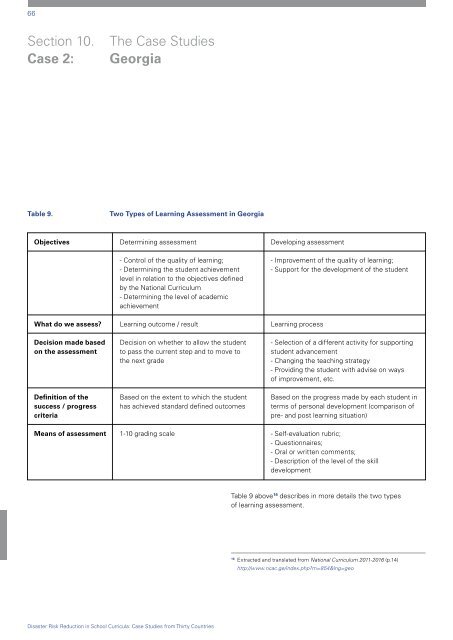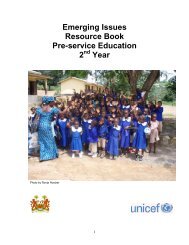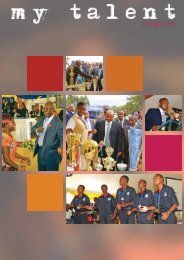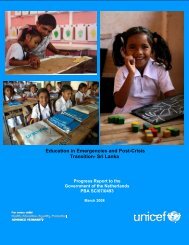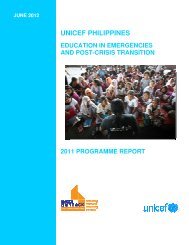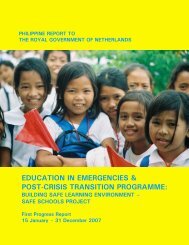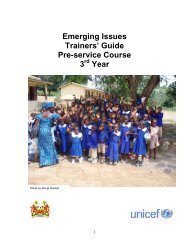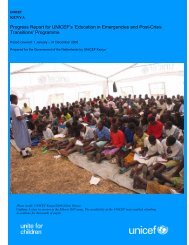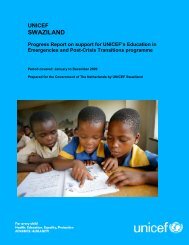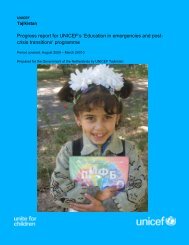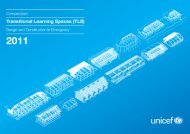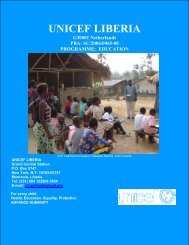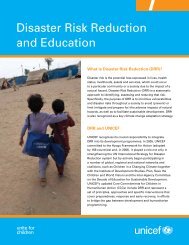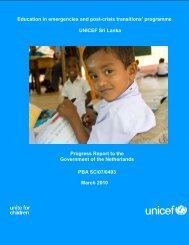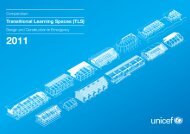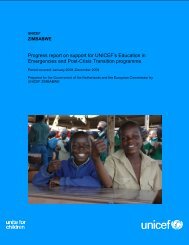Disaster Risk Reduction in School Curricula: Case Studies ... - Unicef
Disaster Risk Reduction in School Curricula: Case Studies ... - Unicef
Disaster Risk Reduction in School Curricula: Case Studies ... - Unicef
You also want an ePaper? Increase the reach of your titles
YUMPU automatically turns print PDFs into web optimized ePapers that Google loves.
66<br />
Section 10.<br />
<strong>Case</strong> 2:<br />
The <strong>Case</strong> <strong>Studies</strong><br />
Georgia<br />
Table 9.<br />
Two Types of Learn<strong>in</strong>g Assessment <strong>in</strong> Georgia<br />
Objectives<br />
What do we assess?<br />
Decision made based<br />
on the assessment<br />
Def<strong>in</strong>ition of the<br />
success / progress<br />
criteria<br />
Means of assessment<br />
Determ<strong>in</strong><strong>in</strong>g assessment<br />
- Control of the quality of learn<strong>in</strong>g;<br />
- Determ<strong>in</strong><strong>in</strong>g the student achievement<br />
level <strong>in</strong> relation to the objectives def<strong>in</strong>ed<br />
by the National Curriculum<br />
- Determ<strong>in</strong><strong>in</strong>g the level of academic<br />
achievement<br />
Learn<strong>in</strong>g outcome / result<br />
Decision on whether to allow the student<br />
to pass the current step and to move to<br />
the next grade<br />
Based on the extent to which the student<br />
has achieved standard def<strong>in</strong>ed outcomes<br />
1-10 grad<strong>in</strong>g scale<br />
Develop<strong>in</strong>g assessment<br />
- Improvement of the quality of learn<strong>in</strong>g;<br />
- Support for the development of the student<br />
Learn<strong>in</strong>g process<br />
- Selection of a different activity for support<strong>in</strong>g<br />
student advancement<br />
- Chang<strong>in</strong>g the teach<strong>in</strong>g strategy<br />
- Provid<strong>in</strong>g the student with advise on ways<br />
of improvement, etc.<br />
Based on the progress made by each student <strong>in</strong><br />
terms of personal development (comparison of<br />
pre- and post learn<strong>in</strong>g situation)<br />
- Self-evaluation rubric;<br />
- Questionnaires;<br />
- Oral or written comments;<br />
- Description of the level of the skill<br />
development<br />
Table 9 above 16 describes <strong>in</strong> more details the two types<br />
of learn<strong>in</strong>g assessment.<br />
16<br />
Extracted and translated from National Curriculum 2011-2016 (p.14)<br />
http://www.ncac.ge/<strong>in</strong>dex.php?m=854&lng=geo<br />
<strong>Disaster</strong> <strong>Risk</strong> <strong>Reduction</strong> <strong>in</strong> <strong>School</strong> <strong>Curricula</strong>: <strong>Case</strong> <strong>Studies</strong> from Thirty Countries


